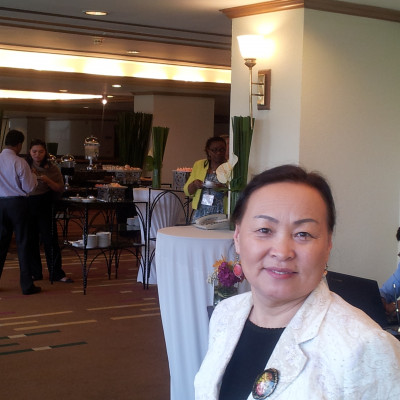Schedule Go Compact (displays all)
You can use Quick Lookup to quickly find sessions. But best is to use the LIVE SCHEDULE during the conference itself.
Please note
This search only includes sessions starting on 13th August [Asia/Tokyo]. It does not include asynchronous sessions.
Mini-Bibliobattle and Extensive Reading: A Case Study of a Japanese University #1586
This study will report a case study of an 8-week-ER class where a maximum of 60 university students will participate in Mini-Bibliobattle. Mini-Bibliobattle refers to a book review battle, where students present their favored book for 3 minutes in their L2 and the listeners decide the best one.
Contradictory Info on Graded Reader levels. Which do we Believe? #1569
Graded Readers are supposedly "graded" according to their difficulty. While the grading may be internally consistent for a specific publisher, comparing even a few of the most popular series shows that books with identical headword counts can be labelled at widely different levels. Background info and suggestions will be offered.
Motivating Chinese Higher Vocational College Students in English Reading #1598
In an ongoing English reading course at a Chinese higher vocational college, a variety of extensive reading programs have been carried out. Students’ homework, feedback and the results from course questionnaire indicate that some are motivated to read and many find the course interesting and inspiring.
Extensive Reading Using Authentic Materials with Elementary and Secondary EFL Students #1556
This presentation will review an 8-week study that used authentic digital books with elementary and secondary students learning English in a foreign language setting. Participants were at the basic levels of CEFR. Study procedures and outcomes will be discussed.
Activating Language Communication Classes through Extensive Reading Channels in a Pandemic Hybrid Setting #1555
In its second phase of implementation, in a pandemonium set up that can even curtail teachers' and students' motivation, ER, being adaptable, thrives and can support the primary curriculum to engage learners in language communication activities. Are you new to ER or contemplating implementing it? Then come and join!
Active Learning in an Online Setting Utilizing Extensive Reading and Digital Storytelling #1588
In this paper, a classroom practice is reported in which extensive reading was combined with digital storytelling. It was conducted in an EFL reading class at a national university in Japan. The objective was to provide learners with an opportunity of extensive reading, story analysis, and active learning.
Current Issues and Development of Graded Readers for Japanese Language Learners #1543
In this presentation, we will first give an overview of the currently available graded readers for Japanese language learners and point out some of the problems. Then, we will explain how we have developed our new graded readers for beginning Japanese learners.
Comic Readers in the EFL Classroom? Yes, of course! #1703
Are you looking for fun and easy reading materials for your students? Have you ever thought about using comic readers with your students? e-future's Graded Comic Readers are fun and engaging stories designed to help EFL students improve their overall English language abilities. Your students will have fun and gain confidence as they learn new vocabulary and grammar, while improving their reading, speaking, and listening skills. Comic Readers not only help students become successful language learners, but also allow student to develop a positive association with reading. This session will 1) introduce e-future's Graded Comic Readers, 2) explain the benefits of using comic readers and 3) provide activity ideas for comic readers.
Learner Audio Use in a Large Extensive Reading Program #1599
Learners in a large extensive reading program at a Japanese university using Xreading had access to audio recordings for each book. Presenters will report on why some learners chose to listen and will characterize the methods learners used to do so. Data from surveys and interviews will also be shared.
How Does Extensive Reading Help Japanese EFL Learners’ Summary Writing Ability? #1597
The aim of the study is to examine how extensive reading would help Japanese EFL learners to develop summary writing ability. The results indicated that the ER group developed their ability to provide more detailed description of a story with a clearer sequence of events than their counterparts.
A Task Based Approach to Creating Effective Reading Circle Activities #1544
This presentation will give the results of the instructor’s experience designing tasks for Reading Circles built on multiple copies of the same set of Graded Readers in a modified ER-based program. The presentation will explore a number of activities including reports that target vocabulary acquisition and integrate online digital tools
Transitioning a University Extensive Reading Program from Print to Digital Books: M-Reader to Xreading #1575
This paper reports on the transition from physical to digital books in a university-wide extensive reading program in Japan. Not only will students’ learning outcomes and responses to their online reading experiences be shared, but comparisons of the two learning environments will also be offered: paper-based reading and screen-based reading.
Six Content Elements that Motivate Learners to Read #1709
To motivate learners, reading content must instill genuine interest. We need to feel a connection to the material which makes us want to find out more. This paves the way for a lifelong, sustainable - and enjoyable - reading habit. In this session, featuring examples from National Geographic Learning graded readers, we will discover six elements that inspire English learners to go beyond a superficial glance at a passage to explore and analyze the text.
How to Start an ER Program without Graded Readers #1692
In this presentation we will explore other resources which are available online and which can be downloaded and printed out for your students. These resources can be used in class or even taken home since ER does not need to be done in the classroom. Students can read in their own time at their own pace. Participants will be provided with information on many resources that are available – well over 2000 texts!
Action Research into Reading Activities for Building Motivation and Skills #1609
This short presentation reports on action research into the baseline reading profiles of students and factors that may have impacted on learners’ past reading experiences. A reading project with graded reading, timed reading, and Reader’s Theatre was introduced to build skills and motivation for low proficiency university freshmen in Japan.
ER and Reading Targets - An Investigation into the Rationale behind Teachers’ Choices #1581
Deciding reading targets is often an important aspect of planning an ER program. However, little is known regarding teachers’ rationale behind those choices. In this presentation, the authors will attempt to shed light on those reasons based on the results of a qualitative study.
Extensive Reading Habits and Attitudes of EFL Learners: the case of Lower Secondary Schools in Ethiopia #1658
Reading literacy is significant for learners’ academic success, and high levels of reading literacy can be established through strong engagement in extensive reading. This study, thus, investigated lower secondary school learners’ habits and attitudes toward extensive reading. The data were collected from 377 learners in North Wollo Zone, Ethiopia, using a survey questionnaire. Descriptive (frequency, percentage, mean, standard deviation) and inferential (independent samples t-test) statistics were used to analyze the data. The findings of the study indicated that majority of the learners’ habit of extensive reading was poor: a great majority of them did not read any book over the last year, and most of them did not read for pleasure every day at all. The finding of the study also showed that most of the learners’ attitudes toward extensive reading was not favourable, and they mostly read for academic purposes. It was also found that there was no significant difference between gender and age of learners regarding their extensive reading habits and attitudes. Lack of appropriate reading materials, low English ability, and lack interest in reading are the major factors that affect learners’ leisure reading habits. Based on the results, it can be suggested that integrating extensive reading programme (accessibility of a wide range of interesting reading materials based on the learners’ linguistic level and interest) in input-poor English as a Foreign Language contexts like Ethiopia is essential to promote learners’ extensive reading habits and develop positive attitudes toward (extensive) reading.
Experiencing ER in Thailand #1659
Extensive Reading has yet to gain popular support in Thailand and is not widely implemented at the high school level. This presentation will describe the realities of setting up, running, and managing an Extensive Reading Project and integrating it into the curriculum to form a fundamental base in the instruction of English. After 5 years we will demonstrate the scores our students achieve in comparison to other Thai schools in the national O-Net tests, and progression over the years through the annual Oxford Online Placement Test that students take. We will conduct a survey about student attitude toward reading at the end of July 2021 just before the conference to give an up-to-date reflection from students about their feelings toward reading in general and extensive reading in particular. There will also be a reflection from teachers about implementing XReading as a tool when the COVID pandemic forced a move away from physical copies of books and the use of the MReader website.
How AI Devices Help Young Learners with Extensive Reading at Home? #1558
It will be a pre-recorded video on how AI devices help young leaners on extensive reading at home. Chinese presentation with English subtitles.
The implementation of English Literacy Program in SPK School Setting During the Ongoing COVID-19 Pandemic #1567
In this presentation, we will present the implementation of the English Literacy Program in a Multilingual and Multicultural school setting during the ongoing COVID-19 pandemic in Indonesia. This literacy program is unique because it should nurture our primary students' English literacy from diverse mother tongues and cultures.
Using Graded Reader with Young Learners to explore Targets of the UN SDGs. #1710
Extensive Reading means children engage with a text for a longer time, in a deeper way. Reading about children of their own age who have adventures related to the Sustainable Development Goals can awaken their curiosity too. This video will explore some practical, fun ways of encouraging this.
Our Road in Practicing ER in China: Background, Practice and Reflections #1702
This session looks at the background of Practicing ER in China and asks why it is difficult to set up an ER program in China. Problems and Solutions include: how to choose reading materials; how to guide students to find books at the right level and how to assess. We will also reflect on how to Run ER program in the Future.
Atheists, agnostics and true believers: what instructors in a university extensive reading programme believe about about extensive reading #1686
In this presentation I discuss what instructors involved in an extenisve reading programme believe about extensive reading. While much of the literature on extensive reading argues for the benefits of extensive reading (for example improved reading fluency, vocabulary acquisition and increased cultural knowledge), what instructors believe about the value of extensive reading may differ in several ways from this. Utilizing data taken from a focus group with six instructors who teach in a Freshman English course at a private university in central Taiwan that includes extensive reading as a programme component, findings reveal that teachers bring to bear a wide variety of beliefs regarding extensive reading; these include what I term 'atheism' (a lack of belief in the approach), 'agnosticism' (doubts about the efficacy of extensive reading) and 'true belief' (an acceptance that extensive reading is of benefit to L2 acquisition). Analysis of the data shows that such teacher beliefs are informed by previous experiences as an L2 reader, prior experience teaching reading and beliefs about the reading habits of students. This presentation makes the case that extensive reading programmes should allow instructors to adopt a variety of approaches to implementing extensive reading that are in keeping with individual teacher beliefs.
Using graded readers to supplement courses #1704
This presentation will provide an overview of Halico Online and how five graded readers from the 10-ways-to series were used to supplement a presentation and debate course at a Japanese university.
The Experience Sharing Practices of Extensive Reading Teachers in Mongolia #1690
A total of 50 secondary school English Teacher involved in Experience sharing practical training to expand their extensive reading performances at 17 different provinces and districts of Mongolia. These participants, who have been teaching English at public and private schools were asked to 5 different exercising group “How to invest extensive reading in the remote country local school”, “How to combine the curriculum and extensive reading activities”, “How to motivate the graded readers”, “How to invest extensive reader at local school” and “How to integrate English readers to other subjects at school”. For the exercise groups, the instruction time was four-day-experiments for seeking the best practices how to expand Extensive Reading approach among other English teachers those not using extensive reading tools. Four-day-experience sharing practical training later, listened 15-minute micro training presentations from each group and questions, clarification and feedback on each presentation. The major findings are as follows: 1) Extensive reading invested by local school alumna, 2) Extra curricula and school activities maximized by extensive reading clubs. The results of this experience sharing, 14 the best practitioners were recognized to coach other new instructors to perform extensive reading approach in Mongolia.
Literature in secondary EFL class: Case studies of four experienced teachers’ reading programmes in China #1579
To explore the integration of literature into secondary EFL teaching, this exploratory multiple case study investigates four reading programmes implemented by experienced teachers in Chinse secondary schools. Data were collected from teachers’ reflective journals, semi-structured interviews, and related documents and artefacts. Implications are discussed in relation to teacher education.
Japanese University Students’ Attitudes Towards Extensive Reading in the Digital Age #1572
With the ubiquitous use of digital devices, it would seem that a technological solution to ER may be just as beneficial as a paper-based approach. Hence, this mixed-methods research project looks at how first-year Japanese EFL university students experienced a yearlong, technologically-assisted extensive reading curriculum in terms of their reading attitudes.
An Investigation of EFL Students' Perceptions of their Extensive Reading and Flow Experience #1560
This study investigated the students’ perception of their extensive reading and flow experience (FE) including conditions that enabled FE.
Welcome to LoungERs - an informal monthly chat about ER topics #1657
Major events such as ERAW and ERWC are immensely stimulating for attendees. In addition to attending Insightful presentations and workshops, attendees have chances to meet and talk with other educators using ER from far and wide. These chance conversations can spark new lines of thinking and areas of collaboration. The coronavirus pandemic has taught us that technology can bring us together despite being separated by physical distance. In 2020, the JALT ER Special Interest Group started a monthly informal gathering using Zoom meetings. The monthly meetings let friends of ER meet a little more regularly. People who come by share ideas, talk about favorite books, or sometimes discuss research. We aim to keep things informal, and building camaraderie is just as important as deepening our extensive reading knowledge. Please come by, and learn more about how you can join in.
Setting Extensive Reading Goals to Achieve Reading Rate Gains #1590
Beglar and Hunt (2014) suggested that completing the equivalent of 7,200 standard words of extensive reading per week will facilitate substantial reading rate gains. The goal of this study was to investigate the feasibility of such a goal for learners of Japanese. Results, pedagogical implications, and suggestions will be discussed.








































